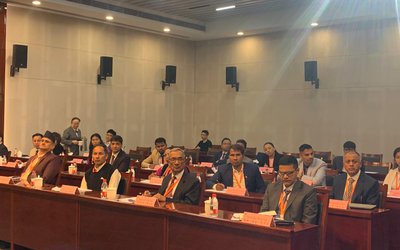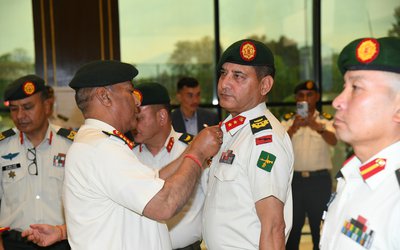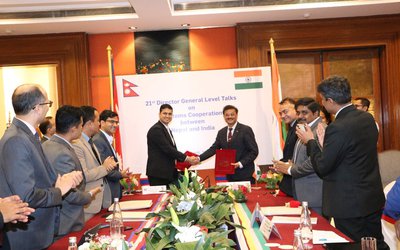The tempo over UNMIN’s ouster call – at least clipping its wings – has reached a crescendo in the past week.
What started with army chief General Chhatraman Singh Gurung knocking at the doors of political leaders – telling exception were the Maoist leaders – culminated with the Prime Minister calling the meeting of all parties – sans the Maoists – to discuss the UNMIN exit plan.
Controversies surrounding the UNMIN have always gained an edge whenever its term comes up for renewal.
The UNMIN’s term has been extended six times since it was established four years ago.
Its seventh extension is set to be discussed when the United Nations Security Council meeting on September 7 takes up the Nepal agenda.
Before which the government has to decide what it wants to do with the UNMIN.
All indications suggest that this time around, the government is in no mood to extend the term of UNMIN without reviewing its mandate.
In the all party meeting he chaired, PM Madhav Kumar Nepal was uncharacteristically critical of the UNMIN. He pointedly accused it of bias toward Maoists and of ineffective monitoring of Maoist combatants.
Examples were cited how the armed combatants have been found entering and exiting the cantonments at their will despite the supposed UNMIN monitoring and supervision.
The bottomline was, subsequently, spelled out by PM Nepal’s hawkish Defense Minister. “We are willing to extend the term of UNMIN for a couple of months only by cutting its mandate and pulling out Nepali Army from under their supervision,” said Defense Minister Bidya Bhandari.
The PM was able to garner support for his line at the all party meeting where most senior leaders suggested him to tread a cautious path by taking the UN into confidence over whatever decision it wants to take.
Aside from his political maneuvering, the PM also let loose the army chief and permitted him to meet with political leaders to lobby in favor of UNMIN’s exit or at least its reduced mandate – read keeping NA out of its supervision.
All this has made the other party of the peace process, the Maoists, understandably jittery.
The Maoists who feel insecure at letting the UNMIN go at this juncture have been taken by surprise over army chief’s lobbying. In fact, Prachanda and his senior comrades rushed to meet with the PM, in the middle of their ongoing central committee meeting, to discuss the UNMIN issue. They urged the PM to write a letter to UN asking for renewal of UNMIN term – without changing its mandate – for another six months.
Notwithstanding the Maoist request, the writing seems to be on the wall for the UNMIN. The UN body, which is said to have rankled the powerful neighbor who feels its turf is being violated, can no longer hope for smooth sail regarding its term extension.
Equally unclear is what will unfold once this row pushes UNMIN out of the picture. Coming at this crucial juncture when the peace process is faltering, the absence of UNMIN will create a big void. And everyone knows how politics loathes vacuum and void. And how they can lead to unforeseen paths with unforeseen consequences.






